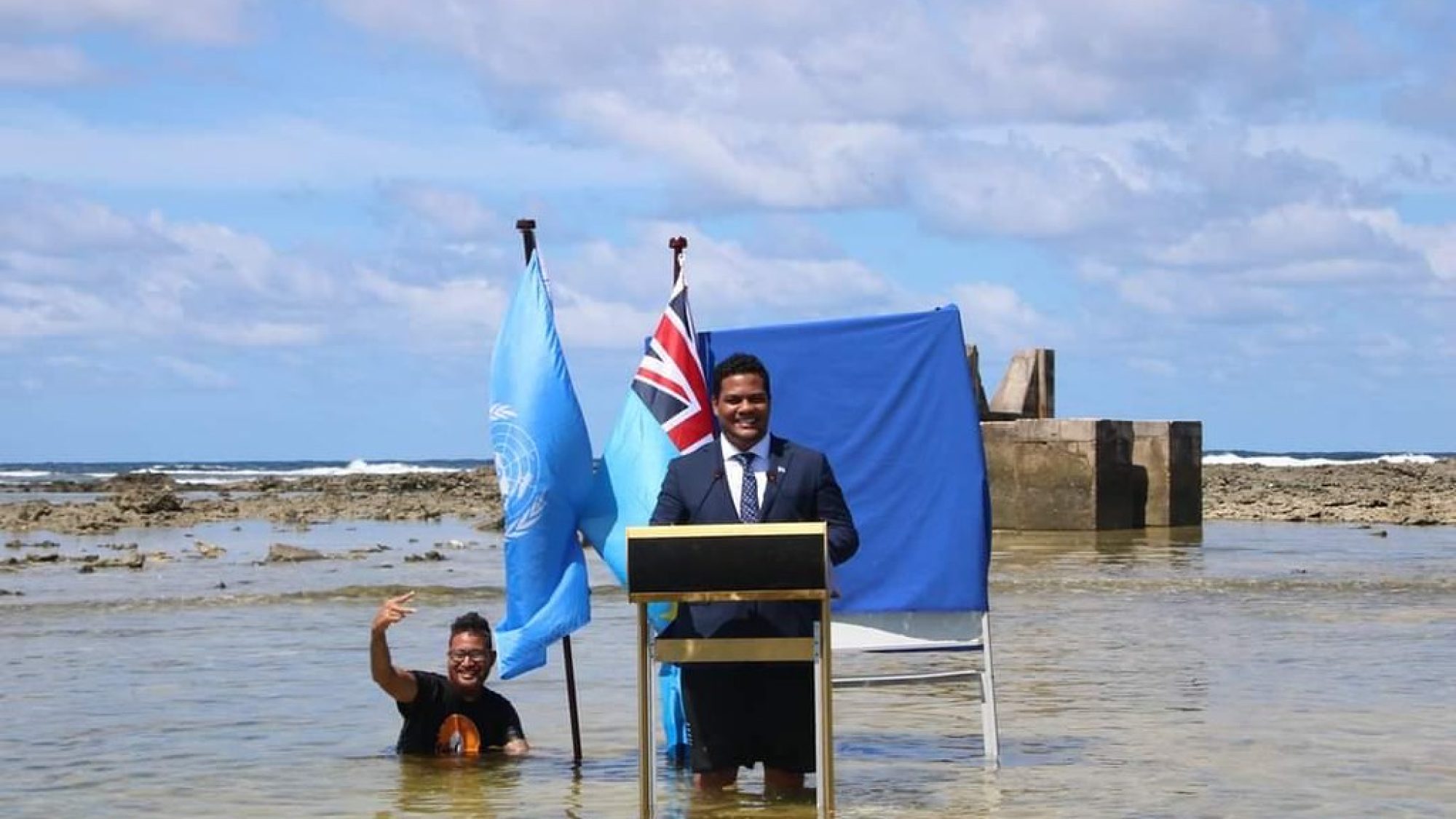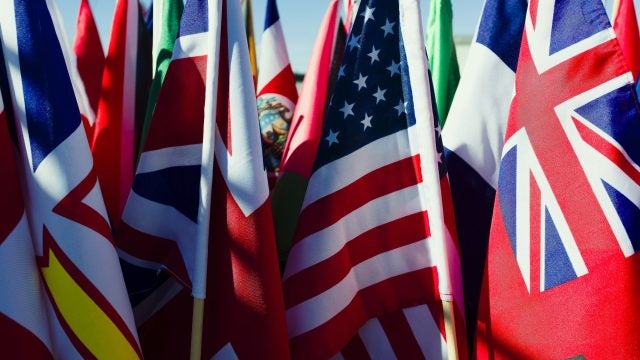
Title: Climate Leadership in the ‘Disappearing Islands’
The existential threat of climate change to atoll nation-states is both material and discursive. The atoll nation-state of Tuvalu faces twin climate change challenges: sea level rise that threatens the habitability of its islands, and a narrative burden associated with the ‘disappearing islands’ as a global signifier of climate change urgency and vulnerability. The ‘disappearing islands’ narrative dominates global discourse about Tuvalu, marginalizing awareness of climate leadership and adaptation innovation occurring in Tuvalu that affirms Tuvaluan values and culture, exemplified through selective media reporting on the Tuvaluan Foreign Minister’s Nobel Peace Prize nomination.
In the Pacific Islands, also known as Oceania, national governments, activists, churches, and civil society have been working for many years, across multiple arenas, to address the challenges of climate change, particularly sea level rise. For the nation-states comprised entirely of low-lying atolls, climate change is often discussed as an existential threat, capturing the possibility that sea level rise may render entire national territories uninhabitable. Indeed, the ‘disappearing islands’ narrative has captured global imaginations and atoll nations such as Tuvalu have become signifiers of climate change vulnerability and urgency. In this paper we argue that the dominance of this narrative in arenas such as global media and diplomacy requires questioning. While somewhat important for awareness raising about climate change impacts, the ‘disappearing islands’ narrative can have the effect of marginalizing recognition of atoll climate leadership. Indeed, there are less well-known, but arguably important instances of climate leadership and adaptation innovation in atolls that need to be recognized, reported upon, and indeed celebrated for centralizing and affirming Indigenous values, culture and self-determination. We explore why more attention should be devoted to the ways in which atoll people are maintaining a sense of their identity and self-determination as they face a possible future in which their islands become uninhabitable.
A number of Oceania’s atoll Indigenous political and community leaders are addressing climate change impacts, often in both international climate change negotiations and in projects within the islands. These include former President of Kiribati and twice-Nobel Peace Prize nominee Anote Tong; Marshallese poet, performance artist and educator Kathy Jetñil Kijiner; and climate activist, pastor and scholar Maina Talia. Another atoll leader, Tuvalu’s current Foreign Minister, the Honourable Simon Kofe, who was recently nominated for a Nobel Peace Prize, has also addressed climate change challenges. Tuvalu, without significant greenhouse gas emissions given its roughly 11,000 population, cannot directly effect material change in global emissions reductions. Exploration and implementation of innovative ways to adapt to climate change, however, is not necessarily inhibited by a small population, as Kofe’s leadership demonstrates. His work involves multiple areas of climate change adaptation, particularly in international law, including the securing of Tuvalu’s maritime boundaries. This protects Tuvalu’s Exclusive Economic Zone from being diminished should island territory recede with rising sea levels. Kofe is also leading a radical plan for a digital government, Tuvalu 2.0, should the land territory become uninhabitable.
Kofe’s nomination for the Nobel Peace Prize was well-publicized in global news and social media. However, the newsworthiness of the nomination revolved almost entirely on only one of Kofe’s achievements: Kofe’s speech to the 26th United Nations Framework on Climate Change Conference of Parties, in which he was filmed speaking while partially submerged in Tuvalu’s coastal waters. Designed to draw attention to the seriousness of sea level rise risk in Tuvalu, the dramatic imagery recalled former Maldivian President Mohamed Nasheed’s underwater cabinet meeting in 2009, which also sought to raise awareness about climate change impacts on atoll nation-states.
The global media when reporting on Kofe’s Nobel Peace Prize nomination failed to sufficiently capture his climate leadership. Media reports of the nomination largely omitted or only briefly mentioned Kofe’s work on Tuvalu 2.0 and securing Tuvalu’s maritime boundaries in favour of extensive coverage of the COP 26 speech. While Kofe’s choice to globally disseminate footage of his partially submerged speech can be interpreted as a successful way of claiming back the authority to represent atolls in a warming world and resisting the behemoth ‘disappearing islands’ narrative that often cannot see past atoll people as anything other than passive victims of climate change, this was not matched by media reporting. Indeed, the media has long exhibited an inability or reluctance to portray small island nations such as Tuvalu as anything but climate change victims, or worse, as canaries in the coal-mine. Externally produced representations of Tuvalu have often perceived Tuvalu’s climate change challenges through a lens of Global North environmentalism that at times turns to a problematic kind of ‘wishful sinking’ among those who think that hard evidence of climate refugees fleeing from an island inundated by sea level rise is needed for global scale climate action. When the global media presents Kofe’s Nobel peace prize nomination as most significantly associated with a speech given partially submerged in water, and fail to acknowledge his many other acts as Tuvalu’s foreign minister that demonstrate strong and innovative climate leadership, they reinforce the victim narrative of Tuvaluan people. Indeed, the failure to report on Kofe’s innovative climate leadership is ecocolonialist and an example of climate injustice.
In addition to his climate leadership, Simon Kofe has also recently headed the development of a new foreign policy for Tuvalu that centralizes Tuvaluan culture and values. This is occurring in a context of greater recognition of the Indigenization of foreign affairs in Oceania, and an understanding that Western diplomacy is not the only way in which international relations issues, including climate change, can be addressed. For example, the Tuvaluan concept of fale pili (looking after one’s neighbour), is vital to Tuvalu’s international engagement, as it positions Tuvalu not as a victim perennially reliant on external assistance but as a good neighbour that helps out others when possible. Similarly, the acknowledgement, recognition and celebration of Indigenous climate change leadership means that a more complex story of climate change emerges, not one of simply a threat to habitable land. Tuvaluan people are also maintaining a sense of their identity and self-determination, and drawing on their strong culture, unique values, and innovative ideas as they face a possible future in which their islands become uninhabitable. Such themes could become newsworthy, and thus dislodge some of the dominant narratives of atoll vulnerability, if the global media take responsibility for framing reporting on climate change impacts in atoll states differently. It is important to tell stories of climate leadership and adaptation innovation in atolls such as Tuvalu that centralize and affirm Indigenous values, culture and self-determination, rather than continually reproducing a one-sided narrative of vulnerable disappearing islands.
. . .
Carol Farbotko is a cultural geographer whose work focuses on climate, justice and culture in Oceania. She is currently affiliated with the University of the Sunshine Coast, Australia.
Taukiei Kitara is an Indigenous knowledge holder, climate activist and independent scholar from Tuvalu.
Image Credit: Flickr; Creative Commons License 2.0; World Meteorological Organization
Recommended Articles

This article compares U.S. and Chinese approaches to artificial intelligence (AI) exports in Africa and examines how these disparate approaches have produced both downstream benefits and challenges for the region.

On May 20, 2025, the World Health Assembly unanimously adopted the World Health Organization (WHO) Pandemic Agreement, an international treaty designed to strengthen pandemic prevention, preparedness, and…

As the Trump administration proposes a sweeping overhaul of the US foreign assistance architecture by dismantling USAID, the Millennium Challenge Corporation (MCC), and restructuring the State Department, there is an…